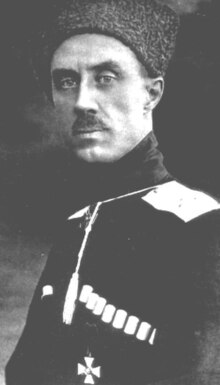Pyotr Nikolaevich Wrangel
Baron Pyotr Nikolayevich Wrangel ( Russian Барон Пётр Николаевич Врангель ., Scientific transliteration Baron Pëtr Nikolaevič Vrangel ' ; German baron Peter von Wrangel , * August 15 . Jul / 27. August 1878 greg. In Novoalexandrovsk today Zarasai , Lithuania ; † 25th April 1928 in Brussels ) was a leader of the anti-communist White Army in the Russian Civil War . With the military rank of lieutenant general , he operated with the troops under his command in southern Russia from 1918.
origin
He was a descendant of the well-known German-Baltic family of Wrangel . His parents were Nikolai Yegorowitsch Wrangel (* July 6, 1847 - July 2, 1923) and his wife Maria Dmitrijewna Dementjewa (* April 5, 1856).
Life
After successfully completing his training at the Mining Institute in Saint Petersburg , he volunteered in a cavalry regiment of the tsarist army in 1901 , where he was promoted to officer in 1902 . After taking part in the Russo-Japanese War , he was involved in the 1906 punitive expedition under the orders of General A.N. Orlov was sent to the Baltic States by the Tsar . In 1910 he successfully completed further training at the Academy of the General Staff. During the First World War he was the commander of the 1st Nertschinsk Cossack Regiment of the Transbaikalkosaken "Tsarevich" . In the wake of the October Revolution he went to the Crimea , where in August 1918 he joined the newly formed units of the White Army . Within the army of the whites, he initially took on the duties of commander of a cavalry division . In the spring of 1919 he took over command of the white volunteer units stationed throughout the Caucasus and inflicted a serious defeat on the Soviets by breaking up the Red Army group there.
Due to a conflict with General Denikin , Wrangel was briefly forced into exile. On April 4, 1920 he was then commander in chief of the white units in the Crimea.

After losing half of his army in fighting with the Bolsheviks, the last units of his army left the Crimea on November 16, 1920. Wrangel himself went to Yugoslavia via Turkey and Tunisia , where he acted as head of the whites who had fled Russia. In exile he founded the Union of All Russian Military Associations (Russian Русский общевоинский союз). The aim of this organization was to hold together all the white troops who had fled abroad and to foment a guerrilla war against the Bolsheviks in the Soviet Union . He also devoted himself to writing his memoirs in exile. These were published in 1928 under the name “Notes” (Russian Записки) both in the magazine committed to the cause of the whites (Белое дело) and in Berlin.
On April 25, 1928 Wrangel died in exile in Brussels after a brief serious illness. His family suspected that he had been poisoned by his butler's brother. This man, who was believed to be a Soviet secret agent, had temporarily lived in the Wrangels house. Shortly after the visit was over and the guest had left the house, Wrangel suddenly fell seriously ill and died only a little later. Wrangel was buried in Serbia . His grave is in the Russian Orthodox Church of the Holy Trinity in Belgrade , at Tašmajdan Park . His followers erected a memorial to him in the Serbian city of Sremski Karlovci , where the headquarters of the Holy Synod of the Russian Orthodox Church in exile was located.
literature
- W. Bruce Lincoln: Red Victory: A History of the Russian Civil War. Simon and Schuster, New York 1989, ISBN 0-671-63166-7 .
Web links
- Pyotr Nikolajewitsch Wrangel at adelsvapen.com
| personal data | |
|---|---|
| SURNAME | Wrangel, Pyotr Nikolayevich |
| BRIEF DESCRIPTION | Russian general during the Russian Civil War |
| DATE OF BIRTH | August 27, 1878 |
| PLACE OF BIRTH | Zarasai , Lithuania |
| DATE OF DEATH | April 25, 1928 |
| Place of death | Brussels |
